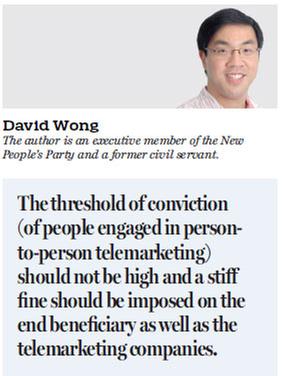Annoying telemarketing calls require assertive regulation

Many people in Hong Kong, including myself, are very disturbed by the annoying person-to-person telemarketing calls we receive every day. These calls are mostly from financial institutions and beauty companies and are often made at around lunch and dinner time. Obviously, most of us do not require nor are interested in their products and services. Moreover, telephone frauds have been rampant in recent months, which make the public feel even more intolerant toward calls from strangers. As a result, there are growing voices in the community for strengthening regulation of telemarketing calls. It should be noted that telemarketing calls from voice machines, text messages and emails have been effectively banned in Hong Kong since the introduction of "Do-not-call Registers" by the Office of the Communications Authority around 10 years ago, where members of the public who added their phone numbers onto the registers can block themselves from irritating calls generated by computers. The government recently launched a public consultation on regulation of person-to-person telemarketing calls.

The consultation paper sets out three possible policy options - enhancing the trade-specific self-regulatory regime, promoting the use of call-filtering applications in smartphones and establishing a statutory "Do-not-call Register". Should option one be implemented, I believe that basically nothing will change. Having a trade-specific regulatory regime has not been successful in many other sectors, such as regulation of light pollution by giant advertising billboards in Causeway Bay and other commercial areas. If self-regulation were effective, we should have received fewer cold calls. In other words, it cannot reduce the nuisance suffered by the public nor enhance the effectiveness of the telemarketing companies, so I do not think it is worth considering.
The second option is promoting the use of call-filtering applications in smartphones and encouraging users to install apps that would block unwelcome phone calls. I have personally installed an app that does indeed bar some but not all of those unwelcome calls. Moreover, the quality and effectiveness of these apps are uncertain. The merit of the proposal is that a government-created app would have better quality and features that can help the public identify person-to-person telemarketing calls. Moreover, it can screen out uninterested consumers and increase the effectiveness of the telemarketing companies. The biggest weakness of this suggestion is that it does not apply to land-line phones and non-smartphone mobile phone users. While most of us have smartphones nowadays, it cannot be ignored that there are a still significant number of people in Hong Kong that have a land-line at home and use mobile phones with no internet connection. It would be grossly unfair to them if the new measures to regulate person-to-person telemarketing calls exclude them completely. In short, it can only be a supplementary solution.
Establishing a statutory "Do-not-call Register" is no doubt the most effective way. The "Do-not-call Register" for electronic phone calls and messages had a database of 2.9 million last year compared with 1.5 million in 2008 when it was first introduced. During the same period, the number of related complaints fell from 8,792 to only 791, which clearly demonstrated the significant progress achieved. Some unscrupulous merchants may be tempted to circumvent the register by using overseas call centers or internet phone numbers but overseas experience has shown that extending criminal responsibility to the end beneficiary would be enough to deter most violators.
The consultant commissioned by the government said there are about 40 telemarketing companies in Hong Kong. There are around 7,000 people directly or indirectly engaged in person-to-person telemarketing and they make about 210,000 unsolicited calls daily. Assuming the estimate is accurate, it is shocking that there are so many people involved in this line of business. It also explains why the government has been reluctant to enforce an outright ban on person-to-person telemarketing for fear of creating unemployment. However, in today's robust employment market, it would not be difficult for these employees to find new jobs, or better yet, the government could subsidize job retraining and work with public bodies such as the Employees Retraining Board or Vocational Training Council.
Therefore, I urge the government to amend the Unsolicited Electronic Messages Ordinance soon and to set up a "Do-not-call Register" for person-to-person telemarketing. The threshold of conviction should not be high and a stiff fine should be imposed on the end beneficiary as well as the telemarketing companies. Moreover, there needs to be a clear definition for person-to-person telemarketing, including harassment calls and soundless calls. Obviously, business and organizations that receive prior written approval should be allowed to call their members, clients and customers. Calls from non-profit organizations and polling agencies should also be exempted. Person-to-person telemarketing to the land-line of companies should not be discouraged.
I believe that regulating person-to-person telemarketing with new legislation can reduce the disturbance to the public, enhance consumers' rights, protect personal privacy and increase the efficiency and effectiveness of marketing. The government should act hastily to draft new legislation to protect the public interest.
(HK Edition 08/30/2017 page7)
Today's Top News
- US arms sales to Taiwan a dangerous gambit: Editorial flash
- Taiwan opposition lawmakers announce plan to impeach Lai Ching-te
- Boosting consumption will be key in 2026
- No one should remain silent accomplice of racism
- Hainan FTP opens fast lane
- Visa-free measures spur surge in visitors






























